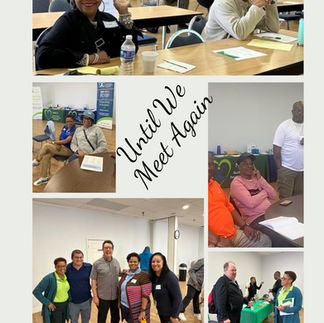The Power of Recovery Stories: A Look at FAVOR’s Recovery Messaging Training Hosted by NIRCO in May
- Jun 14, 2023
- 3 min read
In a world where addiction and mental health issues continue to be shrouded in stigma, the need for effective communication and storytelling is more crucial than ever. Recognizing this, NIRCO recently hosted Faces and Voices of Recovery: "Our Stories Have Power" training on May 25-26 for Northern Illinois recovery community members. FAVOR’s groundbreaking training empowers individuals in recovery to share their stories with purpose, advancing the recovery agenda and combating the pervasive stigma surrounding addiction. By equipping participants with effective messaging tools, this training fosters a diverse, equitable, and inclusive approach to addiction recovery storytelling.
Sharpening Skills as Recovery Communicators:
At the heart of the "Our Stories Have Power" training lies the belief that personal narratives have the potential to create profound change. The training offers a platform for individuals in recovery to harness their experiences and transform them into powerful tools for advocacy and education. By sharing their stories, these individuals become agents of change, challenging societal misconceptions and offering hope to those still struggling.
The training delves into core strategies for addiction recovery messaging, ensuring that participants are equipped with the skills necessary to communicate effectively in various settings. Through workshops, exercises, and discussions, attendees learn how to craft their narratives with authenticity, empathy, and impact. This comprehensive approach enables them to reach diverse audiences, fostering understanding and compassion.
Utilizing a Diverse, Equitable, and Inclusive Lens:
A key aspect of the "Our Stories Have Power" training is its emphasis on embracing diversity, equity, and inclusivity. The program recognizes that addiction affects individuals from all walks of life, and that recovery stories must reflect this reality. By amplifying a broad range of voices and experiences, the training strives to break down stereotypes and promote a more accurate understanding of addiction and recovery.
Participants are encouraged to explore and honor their unique identities and perspectives while sharing their stories. This focus on diversity ensures that recovery narratives reflect the complexity and richness of human experiences. By doing so, the training challenges preconceived notions and fosters a more inclusive dialogue around addiction and recovery.
Fighting Stigma with Personal Empowerment:
One of the most potent weapons against stigma is the lived experience of individuals who have overcome addiction. The "Our Stories Have Power" training recognizes the transformative potential of personal narratives and empowers participants to use their stories strategically. By sharing their journeys openly and honestly, they humanize the issue of addiction, dispelling misconceptions and fostering empathy.
The recovery messaging tools provided during the training enable individuals to deliver impactful speeches, engage in media interviews, and advocate for policy changes. Through these avenues, participants become influential agents of change, challenging stigmatizing narratives and encouraging a society that supports and embraces those in recovery.
Conclusion:
The Faces and Voices of Recovery Training program's "Our Stories Have Power" training is a transformative experience for individuals in recovery. By providing them with the skills and tools to communicate effectively, the program empowers them to become advocates and changemakers in the fight against addiction stigma. Through diverse, equitable, and inclusive messaging strategies, participants learn to share their stories purposefully, fostering understanding and compassion.
In a world where stigma still looms large, it is essential to recognize the power of personal narratives in reshaping public perceptions. By amplifying the voices of those who have experienced addiction and recovery, we can dismantle stereotypes, promote empathy, and build a society that supports and uplifts all individuals on their journey to recovery. The "Our Stories Have Power" training is a significant step towards achieving this vision, and its impact will undoubtedly continue to ripple through communities, inspiring hope and healing for years to come.















Comments